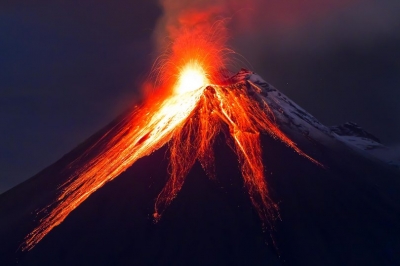
A volcano is an opening in the Earth’s crust through which lava, volcanic ash and gases escape. This lava starts out as magma which originates beneath the Earth’s surface. Magma is a thick-flowing, molten rock mixture that, being lighter than the surrounding rock, rises and collects in magma chambers.
If a magma chamber experiences great pressure it may cause fissures or cracks in the Earth’s surface. The magma then erupts through these fissures and reaches the surface as lava. Many volcanoes sit over magma chambers.
Eruptions also happen when tectonic plates move or collide against one another or when one plate slides under another. The magma is squeezed out between the plates and rises up to erupt as a volcano.
Picture Credit : Google




